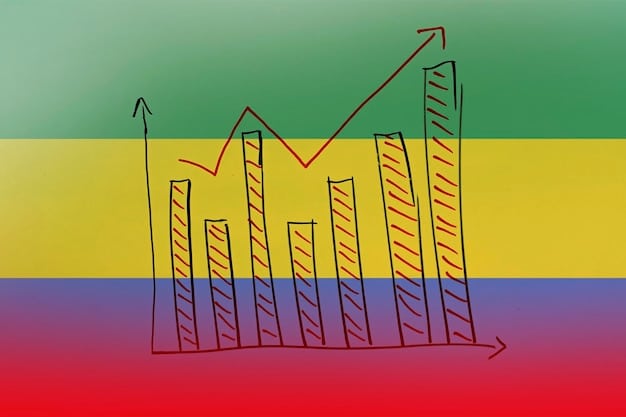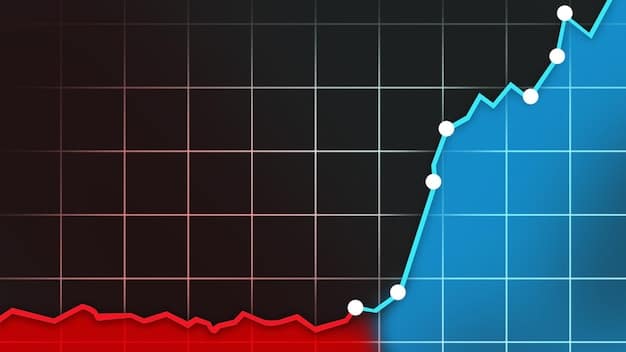Consumer Confidence Index Declines: Recession on the Horizon?

Consumer Confidence Index declines may signal economic uncertainty, but whether they directly predict a recession remains a complex issue influenced by various factors like employment rates and inflation.
The recent declines in the Consumer Confidence Index declines: Is a recession on the horizon? is a topic of increasing concern among economists and consumers alike. As the index dips, the question arises: Are these declines a reliable indicator of an impending recession? Let’s delve into the details to understand the implications.
Understanding the Consumer Confidence Index
The Consumer Confidence Index (CCI) is a vital economic indicator that measures the level of optimism consumers have about the economy. It provides insights into their spending and saving behavior, which can significantly impact economic activity.
What the Index Measures
The CCI is based on surveys of households, asking about their views on current business conditions, short-term outlook, and personal finances. These responses are compiled to create an index that reflects overall consumer sentiment.
How the CCI is Calculated
The CCI is calculated monthly by the Conference Board, a non-profit organization. The survey covers various economic aspects, providing a comprehensive view of consumer attitudes.
- Current Business Conditions: Assesses how consumers perceive the current state of the economy.
- Short-Term Outlook: Measures expectations for the economy over the next six months.
- Personal Finances: Reflects consumers’ views on their financial situation and future prospects.
Understanding how the CCI is constructed helps in interpreting its movements and potential implications for the broader economy.
In summary, the CCI serves as a barometer of consumer sentiment, offering valuable insights into economic trends and potential shifts in consumer behavior.

Recent Declines in the CCI
In recent months, the Consumer Confidence Index has shown a concerning downward trend. These declines have prompted discussions about the potential for an economic slowdown or even a recession.
Factors Contributing to the Decline
Several factors have contributed to the recent declines in consumer confidence. These include inflation, rising interest rates, and economic uncertainty due to global events.
Impact of Inflation
Inflation has been a major driver of declining consumer confidence. As the cost of goods and services rises, consumers feel the pinch and become more pessimistic about their financial situation.
- Increased Cost of Living: Higher prices for essential goods reduce disposable income.
- Erosion of Purchasing Power: Inflation decreases the value of each dollar, making consumers feel poorer.
- Uncertainty About Future Prices: Concerns about future price increases can lead to reduced spending.
Inflation’s impact on consumer confidence is significant, as it directly affects their ability to maintain their standard of living.
In conclusion, the recent declines in the CCI are multifaceted, driven by a combination of economic pressures and uncertainties that weigh heavily on consumers’ minds.
Historical CCI and Recession Correlations
Examining historical data reveals a notable correlation between the Consumer Confidence Index and past recessions. Sharp declines in the CCI have often preceded economic downturns, making it a closely watched indicator.
CCI as a Leading Indicator
The CCI is considered a leading economic indicator because it tends to move ahead of other economic measures. Its predictive power lies in its ability to reflect future consumer behavior, which can either propel or hinder economic growth.
Past Recessions and CCI Drops
Analyzing historical data, significant drops in the CCI have often been followed by recessions. For example, the CCI declined sharply before the 2008 financial crisis and the early 2000s recession.

Limitations of the Correlation
While the correlation is strong, it is essential to acknowledge its limitations. The CCI is not a foolproof predictor, and other economic factors must also be considered. Relying solely on the CCI can lead to false alarms or missed warnings.
- False Positives: The CCI can decline without a recession following.
- External Shocks: Unexpected events can disrupt the correlation.
- Other Economic Factors: Employment rates, interest rates, and global events also play crucial roles.
Using the CCI in conjunction with other economic indicators provides a more reliable assessment of potential economic risks.
In conclusion, while the CCI has historically correlated with recessions, it should be interpreted with caution, considering its limitations and the broader economic context.
Other Economic Indicators to Consider
While the Consumer Confidence Index offers valuable insights, it’s crucial to consider other economic indicators to gain a complete picture of the economic landscape.
Employment Rates
Employment rates are a key indicator of economic health. A strong job market generally indicates a healthy economy, while rising unemployment can signal a potential downturn.
GDP Growth
Gross Domestic Product (GDP) measures the total value of goods and services produced in a country. Positive GDP growth indicates economic expansion, while negative growth suggests contraction.
“### Inflation Rates
”
Inflation rates reflect the pace at which prices are rising. While moderate inflation is normal, high inflation can erode consumer spending and harm economic stability.
- Wage Growth: Monitoring whether wages are keeping pace with inflation.
- Interest Rates: Central banks’ adjustments to interest rates to control inflation.
- Government Policies: Fiscal policies aimed at stabilizing prices.
Tracking these indicators alongside the CCI provides a more nuanced understanding of economic trends.
In summary, a holistic approach involving multiple indicators offers a more accurate and reliable assessment of economic conditions and potential risks.
Expert Opinions on the Current CCI Trends
Economic experts offer diverse perspectives on the current trends in the Consumer Confidence Index. Their insights can help in understanding the potential implications and navigating the uncertain economic landscape.
Differing Views Among Economists
Economists hold varying opinions on the significance of the recent CCI declines. Some see it as a clear warning sign of an impending recession, while others view it as a temporary dip due to specific factors.
Factors Influencing Expert Opinions
Expert opinions are influenced by their economic models, data analysis, and understanding of market dynamics. Different experts may weigh various factors differently, leading to contrasting conclusions.
Predictions and Recommendations
Based on their analysis, experts offer predictions and recommendations for policymakers and investors. These may include calls for fiscal stimulus, interest rate adjustments, or changes in investment strategies.
- Monetary Policy Adjustments: Recommendations for central banks to manage interest rates.
- Fiscal Stimulus: Suggestions for government spending to boost economic activity.
- Investment Strategies: Advice for investors to mitigate risks during economic uncertainty.
Staying informed about expert opinions can provide valuable insights for making informed decisions during uncertain times.
In conclusion, understanding the diverse perspectives of economic experts is crucial for navigating the complexities of the current economic climate and making informed decisions.
Strategies for Consumers and Investors
In light of the declining Consumer Confidence Index and potential economic uncertainty, it’s essential for consumers and investors to adopt proactive strategies to protect their financial well-being.
For Consumers: Budgeting and Saving
Consumers can mitigate the impact of economic uncertainty by creating a budget, cutting unnecessary expenses, and increasing savings. These steps can provide a financial cushion during tough times.
For Investors: Diversification and Risk Management
Investors can manage risks by diversifying their portfolios, rebalancing assets, and seeking professional advice. Diversification can help reduce the impact of market volatility.
Long-Term vs. Short-Term Strategies
Adopting a long-term perspective can help investors avoid emotional decisions during market fluctuations. Short-term strategies may involve adjusting portfolios to capitalize on market opportunities.
- Emergency Funds: Maintaining sufficient savings to cover unexpected expenses.
- Debt Management: Reducing high-interest debt to free up cash flow.
- Professional Advice: Seeking guidance from financial advisors to make informed decisions.
Implementing these strategies can help both consumers and investors navigate economic challenges successfully.
In summary, adopting proactive financial strategies is crucial for mitigating risks and maintaining financial stability during periods of economic uncertainty.
| Key Aspect | Brief Description |
|---|---|
| 📉 CCI Declines | Reflects lower consumer optimism about the economy. |
| 💰 Inflation Impact | Rising prices diminish consumer spending and confidence. |
| 📊 Economic Indicators | Employment, GDP, and inflation provide a broader view. |
| 🛡️ Financial Strategies | Budgeting, saving, and diversification are key. |
[FAQ Section]
▼
The CCI is an economic indicator that measures how optimistic consumers are about the economy. It’s based on surveys about current and future financial conditions.
▼
Recent declines are mainly due to concerns over rising inflation, increasing interest rates, and general economic uncertainty due to global events.
▼
No, not always. While the CCI can signal a potential recession, it’s not a foolproof predictor. Other economic indicators should also be considered.
▼
Besides the CCI, keep an eye on employment rates, GDP growth, and inflation rates to get a more comprehensive view of the economy.
▼
Consumers can create budgets, reduce debt, increase savings, and seek professional financial advice to navigate economic uncertainties effectively.
Conclusion
In conclusion, while **Consumer Confidence Index declines: Is a recession on the horizon?** is a concerning signal, it is not the only factor determining the future of the economy. By staying informed, tracking multiple indicators, and adopting proactive financial strategies, consumers and investors can navigate these uncertain times effectively.





